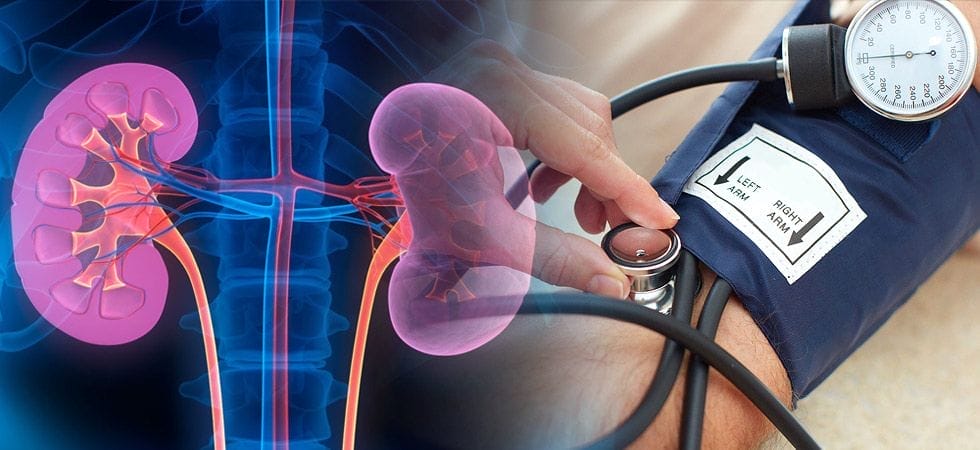Epidemiologic studies have shown that the increasing severity of kidney impairment is related to the prevalence of hypothyroidism and hypertension. Due to changes in thyroid hormone synthesis, metabolism, and control, various thyroid functional abnormalities are seen in patients suffering from Kidney diseases. Although observational studies indicate that hypothyroidism is linked to kidney problems, the molecular-level relationship between thyroid and kidney illness is yet unknown. A few recent investigations have also revealed that hypothyroidism and hypertension are linked to a higher risk of cardiovascular disease and death in kidney patients.
How does high blood pressure affect your kidneys? Can ayurveda help here too?
An extensive network of blood arteries surrounds and supplies the kidney’s nephrons. There are thousands of tiny blood capillaries that supply blood to each nephron. Increased blood flow and uncontrolled high blood pressure tend to restrict, weaken, or harden the arteries. The nephrons do not receive enough oxygen and nutrients from the blood supply due to the damaged arteries. The kidneys no longer have the capacity to filter blood and eliminate waste as a result. High blood pressure makes the kidney’s small blood vessels more vulnerable to harm.

Renin-angiotensin-aldosterone, a hormone that is released by kidneys, helps to maintain blood pressure and is also involved in managing the body’s sodium and water levels. Therefore, on the contrary, the injured kidneys cannot control blood pressure, leading to even higher blood pressure and a cyclic progression of the damage. High blood pressure-related kidney failure is a progressive cyclical condition. However, you may take action right away by controlling your blood pressure and living a healthy lifestyle.
Without a doubt, thyroid diseases must be treated as soon as possible, but the kind and timing of that treatment is also a matter of concern. In thyroid treatments, hormonal abnormalities are typically treated with medication. However, many people are curious as to whether ayurveda can aid in the management of their problems.
Kidney Treatment in Ayurveda
According to Ayurveda, persistent tiredness, dullness, and a compromised immune system are early indicators of thyroid illness. If thyroid disease is discovered early, a healthy diet can be followed, and nutrients can be given to the body to balance the affected doshas. Ayurvedic kidney treatment can work wonders to normalise glandular and hormonal irregularities while treating thyroid diseases. The practice of Ayurvedic medicine is one of the earliest in the history of conventional medicine. It is an ancient Indian practice that aims to harmonise the mind, spirit, and body to prevent disease.

The imbalance of Agni in our bodies leads to the functional issues brought on by hyper- and hypothyroidism. It can be said that vitiation of vata, along with vitiation Kapha in Hypothyroidism and Pitta in Hyperthyroidism, is always present in both hypothyroidism and hyperthyroidism. Therefore, pacifying Kapha and Vata is used to treat hypothyroidism, while pacifying Pitta and Vata is used to treat hyperthyroidism. Dosha vitiation is typically diagnosed using lakshanas, which means the primary diagnosis entails evaluating the signs and symptoms involved. Because these might differ from person to person, the therapy is also individualised.
How is hypothyroidism related to your kidneys? Can ayurveda help here too?
Ayurveda suggests the inclusion of foods that help to control the problem, like the thyroid. Jalkumbhi (Lotus stem) and sahjan (drumstick) is seen to increase iodine levels within the body. At the same time, Dhaniya (coriander) and Jeera (cumin) concocted water helps recover swelling associated with thyroid disorders. Ginger detox tea also seems beneficial, promoting normal thyroid function.

Ayurveda also suggests avoiding using raw veggies, especially broccoli, cauliflower, kale, and Brussels sprouts. These vegetables are known to contain goitrogens. These goitrogens can enlarge a dysfunctional thyroid and cause goitre. A few studies also show that Vitamin D deficiency might worsen thyroid issues. Early morning sun exposure might be used as a treatment for the deficit. Outdoor exercise controls calcium metabolism, energises the thyroid glands, and enhances immunity. Patients with thyroid conditions should abstain from all processed sugars. Limit your consumption of items that naturally contain sugar as well. Vitamin A is abundant in vegetables like broccoli, spinach, and dark green leafy vegetables, as well as in fruits like apples and bananas.
Fruits and vegetables are regarded as health-supportive whole foods in Ayurveda for treating the thyroid. Shifting from a balanced diet may raise your risk of developing nutritional deficiencies and health issues. Numerous studies indicate that consuming a lot of processed food may increase your risk of autoimmune illnesses, but additional studies are required.
Kidney Treatment in Panchakarma
As a part of the creatinine cure in ayurveda, the herb ashwagandha can help. It is also found effective in lowering your stress levels. It is among the most crucial herbs in Ayurveda. According to ayurveda, reducing stress hormone levels may aid with thyroid, blood pressure, and kidney care.

Specific Panchakarma techniques may be required when there is extreme dosha vitiation to treat the symptoms. Vamana, Nasya, Vasthi, and Virechana have taken specially formulated drugs to treat their thyroid difficulties. Specific yoga postures, pranayama, and meditation help treat thyroid issues.
With the use of Ayurvedic thyroid treatment and conventional therapy, thyroid diseases can be managed. The use of such conventional therapies shouldn’t be stopped.
Ayurvedic medicine for kidney disease has helped a lot in treating all types of kidney diseases and removing the root cause. It also aims to rejuvenate the kidney.
*Before taking Ayurvedic herbs, be sure to see your doctor.

